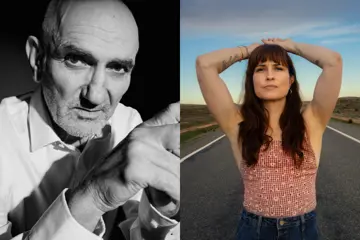Saba has become one of hip-hop’s most unique cultural figures. The Chicago based rapper has continuously taken strides throughout his career with his truely unique brand of music, one that draws on extremely personal lyrical content and musicality. What’s resulted is one of this generation's most important and unique voices, an independent Person of Colour portraying the highs and lows of growing up in one of the most politicised cities in the world.
Ever since the ripe age of 8, Saba has dedicated his life and craft to elevating creativity in the city of Chicago, all manifesting in sharpened writing and performance skills. From building a communal recording studio in his Grandmother’s basement, forming rap collecting from a group of neighbourhood friends known as Pivot Gang, to uplifting creative youth organisations and open mics, Saba is a true representation of community leadership and uplifting.
His pen dragged him across the world following his 2018, deeply reflecting project, ‘CARE FOR ME’. The album depicts the inner workings of his psyche, grappling with the public murder of his cousin John Walt. The 10 tracks reflect on survivor's guilt, toxic relationships, internal struggles all while fighting against a rising tide of systemic injustice.
Nearly four years on from the record, Saba has released his long awaited third studio album, ‘Few Good Things’, featuring the likes of Pivot Gang, Black Thought, Krayzie Bone, 6LACK, Smino, Mereba, Fousheé, Benjamin Earl Turner, and more.
Don't miss a beat with our FREE daily newsletter
The record deconstructs the idea of fulfilment and success. It faces adversity in the face, in a bold and incredibly brave way, all while Saba reflects on the true success of his labour. The album’s title is unique in its presentation of the album’s concept. While ‘Few’ good things may have a depressingly minimal connotation, appreciating the phrases realistic messaging is where beauty is born.
With a ‘Few Good Things’ the listener is provided a platform to reflect on the concept of success and gratefulness. Saba’s ability to portray his very own success, his own blessings, is remarkable. A few good things is always better than none, an empty glass is always full of air, an empty heart always full of memories, an individual is always a part of a family and the story of a Black young man from Chicago defying all odds to uplift his creative community despite trauma and struggle is one that’s full of important, universally relevant lessons surrounding humbleness, ego and love.
Between the nooks and crannies that have defined some of Saba’s most traumatic experiences, forms a man so full of optimism, life and wisdom.
We were lucky enough to chat to Saba following the release of ‘Few Good Things’.
Parry: When do you feel you’re most relieved in the album process? Is it when the songs are done or when it's out in the world? Is it after you’ve played the music live?
Saba: There's a level of relief, I’ve felt relief at many different stages of the album process. The first time I felt relief working on ‘Few Good Things’ was when I started the album. There’s another level of relief when finishing the album. Once the masters came in, I felt that everything was great. It’s a different feeling when it's out in the world, because it's a relief attached to anxiety. It’s done and I just hope people really like it. It’s a new set of problems and things to ponder over. I’m enjoying how I feel now, knowing that regardless how anything goes, I was able to complete a full length record. It was an unorthodox way of recording, using the internet, using Zoom.
The main point of relief though is truly believing in the album, not only is it done but I love this album. That’s the biggest relief, it's done and it's good.
Parry: What is that feeling like, going to the otherside of the world and seeing people in the flesh react to your music that is extremely localised and personal? Is it surreal, is it almost awkward internally or is it all love? Is there a guilt associated with it?
Saba: It can be. It depends on how people react. Sometimes sharing things that are so personal it can create a weird invisible boundary. The boundaries get blurred. Sometimes I have fan interactions where people connect deeply to a line or a story and then reflecting on that, thats a true story or emotion that I felt in my personal life deeply. More often than not its respectful, I’m extremely grateful for my fan base and how intuitive they are. Sometimes people wait for hours after shows to meet you. People understand what I’m experiencing deeply because it's in the music, so they’re not surprised when they meet me, and I am who I say I am. I’m just as excited to meet people who listen to music as I am.
Parry: You’re so self aware, almost too self aware. Do you see yourself as an over thinker, an over reflector, and how do you think that's affected your creative process when forming this record?
Saba: I’m definitely an over thinker, and I’m getting better at it. When I overthink I’m often thinking about music. It’s a push pull relationship, because sometimes when you overthink, especially in music you can have a better product. Sometimes it's terrible because you fall out of love with written music. It’s learning how to balance that. In regular day to day life, it's important for me to become more balanced. With balance I feel more confident and that way I'm able to truly believe in what I’m putting out. Emotionally and artistically. Especially working on this album, pushing to the finish line, its all about trusting emotions and gut feeling.
Parry: Few Good Things feels like the result of pressure and a lot of questioning. Questioning what success is, questioning wealth, generational wealth, your position in the world, your influence, questioning the reality of your success.
Do you think that writing the record led to resolutions/answers to some of those questions or as you describe them fears?
Saba: I didn’t go into this with the intention of answering questions. I don’t think it’s my job as an artist to answer questions for people. To each their own, your definition of success might be completely different to my version of that. I want there to be space and room for that thinking. When it comes to artists, rappers and every individual, not everyone is aiming to be Drake or the most famous or the most popular. That’s an important discussion, especially with the way our music is treated in the public. Some things are more nuanced, most people have their own version of success, Drake included. Everybody is aiming to be the best version of themselves, and when I think of this record, that’s what I get from it. It’s not necessarily about answering the questioning for me, and hopefully that can start a conversation in the listeners life.
Parry: One thing you channel a lot of throughout the record is reflecting the idea of success. Success always has a consequence, success is never finite. Depending on how you live, how you grow up, the idea of success is extremely subjective, which is a conclusion you tackle on this record.
How do you think your perception of success has changed throughout the most in your life and career?
Saba: One of the biggest things that have changed is that I had to look back. What would a younger version of myself say success is? I realised that a lot of things I would have wanted, prayed and hoped for we’ve done already. We are living a successful life per se, to some extent. I think the biggest takeaway that I’m getting is that you can’t be successful if you're not present in a given moment. Being fully present includes how you spend your time, how you spend and allocate your wealth, how much you see your family etc. How much time are you spending with things that are truly valuable. It’s way different to what I thought then. It’s not a chase to be something you're not already. I already exist in the present, so tapping into it is everything. We are already who we want to be.
Words by Parry Tritsiniotis
SEE ALSO
















